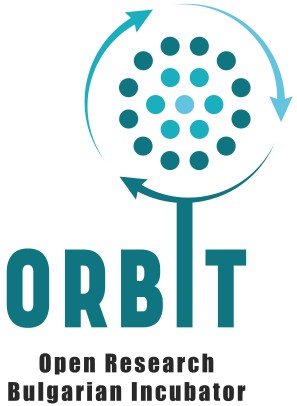
The GUIDE is definitive. Reality is frequently inaccurate.
— The Hitchhiker’s Guide to the Galaxy, Douglas Adams
AUTHORS:
Teodora Gandova
Dr. Ruslana Margova
Assoc. Prof. Milena Dobreva
Acknowledgments:
The authors express their gratitude to all participants in the project “ORBIT – Incubator for Open Science in Bulgaria”, as well as to the team of Science Directorate at the Ministry of Education and Science, Prof. Ana Proykova, Prof. Krasen Stefanov, Assoc. Prof. Bilyana Yavrukova, Dr. Ana Lazarova, Marin Barzakov, and Atanas Karashenski for their valuable ideas and recommendations.
In the creation of this handbook, ChatGPT (GPT-5) by OpenAI was used under the close supervision of the authors.
Quotations from Douglas Adams’s The Hitchhiker’s Guide to the Galaxy are included, Bulgarian translation by Sarkis Aslanyan: Adams, D. (1988). Pŭtevoditel na galakticheskiya stopadzhia. Biblioteka “Galaktika”.
Introduction: What Is Open Science?
Don’t panic! Just share!
Open science, in case you’ve just landed from another planet – or worse, after a triumphant publication in a subscription-only journal – is the radical, slightly implausible, but increasingly unavoidable idea that scientific knowledge should not be locked away in vaults, guarded by hefty paywalls and endless forms in triplicate. Instead, open science scatters research results across the Galaxy so that everyone – scientists, citizens, “curious dolphins” – can read them, reuse them, remix them, and occasionally even misinterpret them.
One of the aims of this handbook is to debunk the myths surrounding open access and open data. No, sharing your research and your data does not instantly deliver a Nobel Prize into the hands of your competitors. Open science is guided by a few basic principles: transparency, accessibility, collaboration, and engagement. The Universe, after all, is “big[, really] big.” And science moves faster when we don’t keep the story of our discoveries locked away.
This handbook is intended for two types of “Earthbound” researchers:
- Young researchers at the beginning of their academic journeys, armed with their first hypotheses and experiments, hoping the Universe will smile kindly upon them.
- Experienced researchers with long careers behind them, who have discovered that science without sharing is like trying to explain the theory of relativity in Vogonese – pointless and painful.
Whether you are a young researcher at the start of your journey or an experienced scholar, this handbook offers tools, resources, and a “towel” (metaphorical, but still essential) to help you survive in the orbit of open science.
The process of open science, as presented in this handbook, can be imagined as a spaceship of interconnected modules, which can be attached depending on the mission at hand:
- Formulating questions (open research projects): when you and fellow researchers co-create ideas and seek feedback early, because other minds – human (or alien) – can improve your theories.
- Collecting and analyzing data (open data, open code, and software): when you gather your research data responsibly, share your software code generously, and document meticulously.
- Publishing research articles (open access, open licenses): when you publish so that others – both scholars and interested readers – can actually read your work without mortgaging their planets.
- Disseminating research outputs (open metrics): when you share your results and let their impact be measured not only in citations but in how many human lives, policies, or galaxies your work changes.
- Mobilizing knowledge (citizen science and science communication): when you engage the public. Science is for everyone – even for the taxi driver who asks what you’re working on.
Each chapter is designed to highlight the familiar problems researchers face in their work and to show how the elements of open science help solve them. The handbook offers practical steps on how to apply open science throughout the research process.
Naturally, this handbook does not claim to be exhaustive. Rather, it is written with a nod to Douglas Adams’s The Hitchhiker’s Guide to the Galaxy, with the intention of encouraging critical reflection among its readers. Its emphasis lies not so much on outcomes as on the path taken to achieve them. The handbook supports researchers in applying the principles of Open and Responsible Research and Innovation (ORRI) throughout the planning, implementation, and analysis of their studies.
Illustrative practices from the European Union and the United Kingdom are included to foster learning, offering ideas and insights that deepen understanding of open science.
Each module of the handbook is linked to the ORRI Thinking Tool – a self-assessment framework for open science competencies – developed by the ORBIT – Incubator for Open Research Project. ORBIT is a joint initiative of the Center for Information Society Technologies (CISTI), Sofia University “St. Kliment Ohridski,” and the NGO “NPO Links,” funded by the REINFORCING Project.
While it does not attempt to cover every element of open science, the handbook focuses on those practices that researcher-travellers, on their galactic scientific journey, can cultivate and expand – ensuring that science becomes more useful and accessible to all.
How to use this handbook
The handbook is structured in a set of standalone modules, each following the same format. Think of it as a spacecraft: every chapter is a module that can be attached when needed. There is no requirement to read sequentially; you can choose only those parts that are most relevant to your interests.
Assess your skills, select a module, “fasten your seatbelt,” and set course for the orbit of open science.
Finally, this handbook is intended to be shared – just as scientific knowledge itself should be. You are welcome to copy, adapt, remix, and distribute it, provided the authors are acknowledged. Just don’t hide it behind a paywall. The Galaxy has quite enough of those already.
